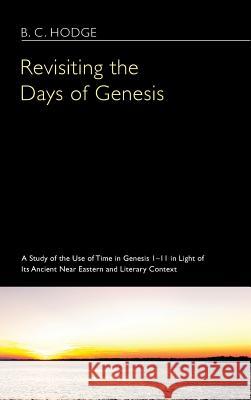Revisiting the Days of Genesis » książka
Revisiting the Days of Genesis
ISBN-13: 9781498257701 / Angielski / Twarda / 2011 / 198 str.
Revisiting the Days of Genesis
ISBN-13: 9781498257701 / Angielski / Twarda / 2011 / 198 str.
(netto: 168,82 VAT: 5%)
Najniższa cena z 30 dni: 175,81
ok. 16-18 dni roboczych
Bez gwarancji dostawy przed świętami
Darmowa dostawa!
Description: A commitment to historical-grammatical hermeneutics often has been confused with a commitment to literal language. Time, in our modern conception, has been construed as a measurement of temporal units, and the numbers assigned to them, as merely counting those units. However, a study is needed to explore whether this is the Genesis author's use of time, and whether numerical values utilized suggest something other than tracking simple measurements. This book attempts to offer an answer to this question by analyzing the ancient Near Eastern and literary context of the Book of Genesis in terms of its use of temporal language in determining its value within the narrative. It is the contention of this book that both of these concepts have been misunderstood to such an extent that these misperceptions often obstruct interpreters from understanding the sociological and theological intent of the author to convey a theology of God, man, creation, and chaos that addresses concerns of both the ancient and the modern reader. Endorsements: ""In Revisiting the Days of Genesis, B. C. Hodge examines the symbolic and theological meanings of time, days, and chronological periods within Genesis 1-11 in light of analogous ancient Near Eastern creation and flood stories and their use of time. The much richer interpretations of Genesis 1-11 that result make a strong case for moving away from preoccupations with trying to harmonize literalistic interpretations of time in Genesis in favor of hearing each text in its ancient context. The strengths of this work are its generous quotation of ancient Near Eastern texts, the clarity of explanations and interpretations of time in Genesis, attention to the history of interpretation in Jewish and Christian traditions, and a clearly stated set of theologically insightful conclusions."" --Dennis Olson Charles T. Haley Professor of Old Testament Theology Chair of the Department of Biblical Studies Princeton Theological Seminary About the Contributor(s): B. C. Hodge holds degrees from Moody Bible Institute and Trinity Evangelical Divinity School, where he has also served as a Teaching Fellow in the Department of Old Testament and Semitic Languages. He is currently pursuing a ThM in Biblical Hermeneutics at Westminster Theological Seminary.
Description:A commitment to historical-grammatical hermeneutics often has been confused with a commitment to literal language. Time, in our modern conception, has been construed as a measurement of temporal units, and the numbers assigned to them, as merely counting those units. However, a study is needed to explore whether this is the Genesis authors use of time, and whether numerical values utilized suggest something other than tracking simple measurements. This book attempts to offer an answer to this question by analyzing the ancient Near Eastern and literary context of the Book of Genesis in terms of its use of temporal language in determining its value within the narrative. It is the contention of this book that both of these concepts have been misunderstood to such an extent that these misperceptions often obstruct interpreters from understanding the sociological and theological intent of the author to convey a theology of God, man, creation, and chaos that addresses concerns of both the ancient and the modern reader. Endorsements:""In Revisiting the Days of Genesis, B. C. Hodge examines the symbolic and theological meanings of time, days, and chronological periods within Genesis 1-11 in light of analogous ancient Near Eastern creation and flood stories and their use of time. The much richer interpretations of Genesis 1-11 that result make a strong case for moving away from preoccupations with trying to harmonize literalistic interpretations of time in Genesis in favor of hearing each text in its ancient context. The strengths of this work are its generous quotation of ancient Near Eastern texts, the clarity of explanations and interpretations of time in Genesis, attention to the history of interpretation in Jewish and Christian traditions, and a clearly stated set of theologically insightful conclusions.""--Dennis OlsonCharles T. Haley Professor of Old Testament TheologyChair of the Department of Biblical StudiesPrinceton Theological SeminaryAbout the Contributor(s):B. C. Hodge holds degrees from Moody Bible Institute and Trinity Evangelical Divinity School, where he has also served as a Teaching Fellow in the Department of Old Testament and Semitic Languages. He is currently pursuing a ThM in Biblical Hermeneutics at Westminster Theological Seminary.











